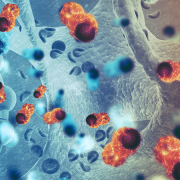Genomics on the horizon: Three predictions for 2023
To kick off the new year, we look at three areas of genomics research and advancement to watch out for in 2023 and beyond
Last week, we looked back at some of the most exciting clinical and research developments in genomics in 2022 – but what might the next 12 months have in store? In this article, we present our predictions for three areas of genomics discovery and innovation most likely to make a splash in 2023.
Discoveries in clonal hematopoesis
Our cells accumulate mutations as we age, and the stem cells that constantly replenish our supply of blood cells are no exception. In some cases, these changes can lead to blood cancers such as leukaemia; however, in a larger number of people they are associated with clonal haematopoiesis, an asymptomatic condition that is linked to a number of other heath problems.
Clonal haematopoiesis affects up to one third of people during their lifetimes, becoming more common with age: only around 1% of people under the age of 40 are affected. The precise cause is unknown but appears to be multifactorial, with some gene variants, smoking and insufficient sleep all found to potentially increase risk.
Although people with clonal haematopoiesis are at increased risk of haematological cancers, the absolute risk remains fairly low. However, it now appears that they may also to be more likely to develop cardiovascular diseases and other disorders associated with ageing, through mechanisms that may involve the mitochondrial genome.
It is becoming apparent that, up to this point, research in this area has only scratched the surface, and we predict that it will be a key area for discoveries in the next few years.
Joining forces: Genomics and epigenomics
In 2022, a number of research papers were published that demonstrated the potential value of looking at genomics and epigenomics together, as opposed to examining them separately – especially when it comes to cancer.
In an article published in Nature, Institute of Cancer Research Professor of Genomics and Evolution Trevor Graham explained, “Genetic testing for cancer mutations only gives us part of the picture about a person’s cancer, and is blind to ‘epigenetic’ changes to how genes are read. By testing for both genetic and epigenetic changes, we could potentially much more accurately predict which treatments will work best for a particular person’s cancer.”
Newer sequencing technologies such as nanopore can simultaneously read both the genome’s DNA sequence and epigenomic marks such as methylation. However, combining both sets of information for clinical purposes is still at a very early stage, and we predict that this will be an area of focus for genomics researchers in 2023.
Advancing our understanding of lipid processing in the brain
Two separate studies in 2022 found links between neurodegenerative conditions and genes responsible for lipid (particularly cholesterol) processing in brain cells.
Researchers from the University of Exeter who had previously suggested that motor neurone diseases are caused by defects in lipid metabolic pathways have gone on to define the specific pathways responsible, and have identified a gene that causes a specific type of neurodegenerative disorder called hereditary spastic paraplegia. These findings are made even more interesting in light of a more recent study focusing on APOE, the gene known to have the single largest effect on the risk of developing Alzheimer’s disease.
“Mounting evidence shows that APOE4 disrupts how different brain cells process lipids, including cholesterol, and that this underlying biology may contribute significantly to the pathology of Alzheimer’s disease,” said Massachusetts Institute of Technology Professor of Neuroscience Dr Li-Huei Tsai, who led the research.
Given the number of people affected by Alzheimer’s disease and its effects in an ageing population, we predict that lipid processing in the brain will be a topic that we will hear much more about over the coming years.









